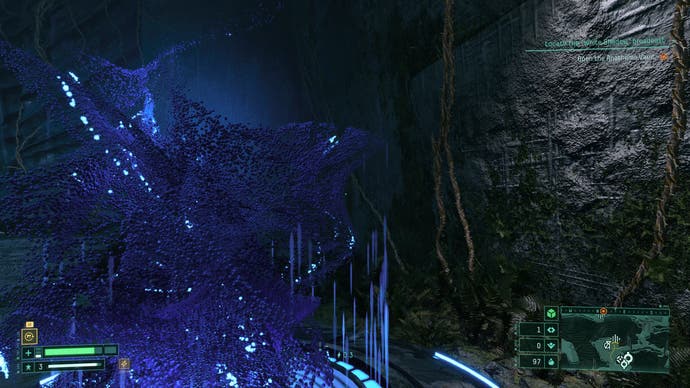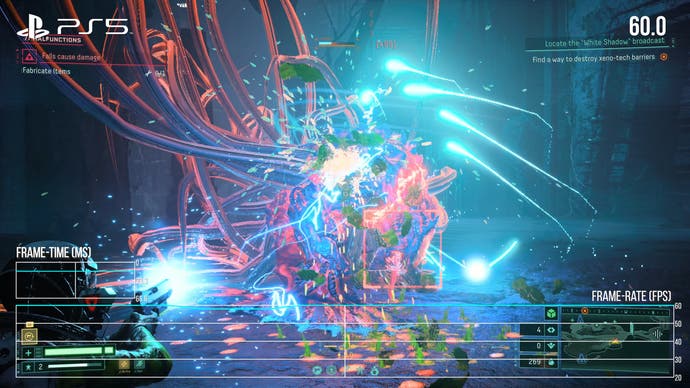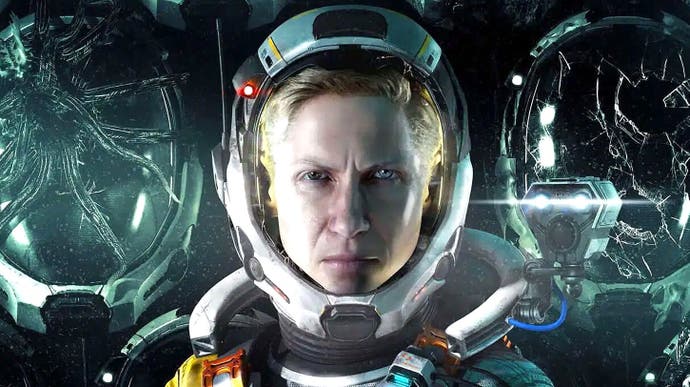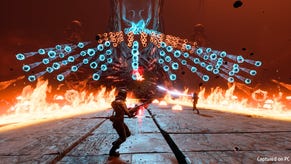Returnal: how a tech powerhouse puts PS5 through its paces
The Housemarque factor.
Housemarque has struck gold again with Returnal - an atmospheric, horror-infused shooter that has dominated my attention since I first loaded it. Think of it is as a 'bullet hell' shooter, merged with a Metroid-like design and roguelike mechanics. Combine this with a story and an aesthetic that merges HR Giger-like influences with Sci-Fi elements from Sphere, Solaris, Prometheus and many more, and you have an original, distinct and intense experience. It's also absolute Housemarque, delivered with the studio's signature technological excellence.
In a sense, we're looking at an evolution of the firm's prior works. Despite fully transitioning now to Unreal Engine 4, there's still the same focus on a super-busy scene driven by a multitude of GPU-accelerated article - and there are so many varieties that all dazzle. Even smaller actions in the game are significant from a technological perspective, to the point where even opening a door leaves fizzling dust in its wake. I absolutely adored the matter translocation effect, where your character dissolves into constituent pieces of matter, which are then shot as energy to the next location before reforming. In fact, particles don't need to particles - you can see fully formed 3D orbs. The game is packed with physicalised particle effects, to the point where the husk of an enemy carcass disperses to uncanny effect as you walk through it.
A brilliant artistic design is bolstered by further impressive effects work - from physicalised dust clouds to beautifully realised rain, along with lit froxel-based volumetric lighting for intense beams of light from the moon overhead. Callbacks to Sci-Fi genre classics are plenty, but I particularly enjoyed the ankle and knee-height fog effects, reminiscent of the egg hatchery in Alien.
If you're a regular Digital Foundry reader or viewer, you'll know that I'm fascinated and delighted by the rapid adoption of ray tracing to the point where I still find the inclusion of hardware-accelerated RT in a games console to be borderline miraculous. Returnal is said to support ray tracing effects, which initially left me puzzled. We're clearly not seeing RT reflections here, it's standard screen-space effects. Ambient occlusion also sees what looks like a conventional screen-space implementation. The PlayStation blog mentions RT for lighting, which initially made me think it could be some kind of bespoke global illumination implementation.
After checking in Housemarque, we got some answers: the PlayStation 5's RT hardware is used to accelerate global illumination queries, essentially speeding up a software-based system and not used for direct visual results. A similar system is used in Nvidia's RTXGI, so I'll be curious if this technology is repurposed in some way for Returnal - RTXGI is a part of Unreal Engine 4 now. Housemarque also shared that the hardware RT system in PlayStation 5 is also used to take the 3D audio in Returnal to the next level: audio environment queries are accelerated with hardware ray tracing support.

Ultimately, the end result with Returnal is a visually rich, absolutely stunning third-person shooter - a genuinely next generation take on the genre. PC gaming is my passion, I mostly play console titles mostly for work - but this is the first console exclusive game that I really want to stick with. Criticisms are thin on the ground but with that said, I do think 3D target tracking to be challenging with the controller and can't help but feel that the experience would feel a lot more intuitive with a PC keyboard and mouse system. Beyond that, it's only really with image quality where I feel a touch let down.
Before we talk metrics, it's really got to be stressed that Housemarque is pushing the new GPU hard. Really hard. The game's visual make-up is based on a density of effects that demands some level of compromise elsewhere in the pipeline. Sony advertises this title by saying it's running at a dynamic 4K - a catch-all term it has used for all manner of upscaling solutions of varying levels of quality. At its heart, Returnal operates at a relatively low internal resolution, then uses a couple of techniques to boost the quality of the output. This starts with temporal reconstruction to 1440p, followed by a checkerboarding pass to deliver a 2160p output.
The end result is a presentation that looks better than the native 1080p pixel counts that tend to emerge from untreated geometry, but this can't really pass as a full-blooded 4K presentation, dynamic or otherwise - especially on certain textures with high specularity, such as wet ground and water surfaces, where you can sometimes see an obvious moire pattern. Image quality in general can sometimes look a little fuzzy or grainy in motion too, owing to the TAA upscaling and checkerboarding.

But looking at the game's visual make-up, the compromise is worth it - especially when considering the final component that works so well for the game: the fact that it's running at 60 frames per second. A high frame-rate is essential for this kind of game, and performance in Returnal is generally great - but not quite perfect. There can be slight stutters in general traversal, while there can also be area-dependent hits to frame-rate when the particle effects really kick in. Even so, we're still in 50-60fps territory here, with 60fps generally the standard. As such, the drops are visible when they happens, but not in a way that will unduly impact your enjoyment of the game. However, this does highlight that variable refresh rate display support at the system level really is needed for PlayStation 5. It would smooth out all of the (minor) issues I encountered when playing the game totally.
And I highly recommend getting this game. With the recent discourse around Sony remaking The Last of Us and apparently cancelling a Days Gone sequel, the perception is - rightly or wrongly - that Sony is entirely wedded to the blockbuster juggernaut for its future plans. Returnal isn't such a game, but it's brilliant nonetheless, and a frankly spectacular effort overall from Housemarque. There's a 'harsh but fair' element to the overall difficulty level (similar to Dark Souls) but in terms of the game concept itself, if you liked Remedy's Control or even Metroid Prime, there are echoes of those offerings in this game. It's so good it may even stand the test of time as one of the greats of the current generation launch period and perhaps even the generation as a whole - and I can't wait to see what Housemarque does next.










